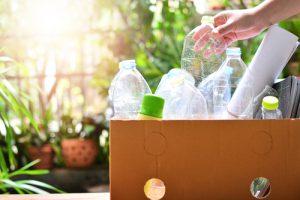
A bipartisan and bicameral group of lawmakers led by U.S. Sen. Rob Portman (R-OH) recently introduced legislation to create a new federal grant program in order to promote consumer education on how to properly recycle.
“Education is a key component to both increasing the amount of material that is being recycled and ensuring that the material being put into community and residential recycling programs is actually being recycled,” Sen. Portman said.
Sen. Portman was joined by U.S. Sens. Susan Collins (R-ME), Todd Young (R-IN), and Debbie Stabenow (R-MI) in unveiling the Recycling Enhancements to Collection and Yield through Consumer Learning and Education (RECYCLE) Act of 2021, S. 923.
The bill, introduced on March 23, would authorize the Environmental Protection Agency (EPA) to issue grants totaling $15 million per year over five years to states, local governments, tribes, nonprofits, and public-private partnerships in order to inform consumers about their community recycling programs.
“Recycling is essential to keeping our lands, waters, and other natural treasures free of plastic and other sources of pollution,” Sen. Collins said on April 2. “Our bipartisan legislation would authorize federal funding to educate consumers on best recycling practices as well as inform communities about recycling programs that are already available to them so that we can all do our part to protect our environment.”
The measure, if enacted, would also direct the EPA to develop a model recycling program toolkit for states, local governments, and other stakeholders to help improve recycling rates and reduce contamination in the recycling stream. The recycling rate in the United States is approximately 32 percent, according to the EPA.
A companion bill, H.R. 2159, was introduced in the U.S. House of Representatives by U.S. Reps. Dave Joyce (R-OH) and Dean Phillips (D-MN).
“Having grown up on the shores of Lake Erie, I know how critical recycling is to keeping Northeast Ohio and its natural resources free of plastic and other types of pollution,” said Rep. Joyce, co-chair of the House Recycling Caucus. “However, nearly a third of all items that are recycled end up in landfills due to ever-evolving rules and contamination.”
The RECYCLE Act has gained the support of nearly 30 organizations, including the National Association of Manufacturers, the Plastics Industry Association, the National Wildlife Federation, and the U.S. Conference of Mayors.



